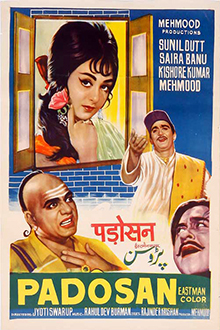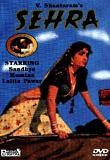
Anandamath is a Bengali historical novel, written by Bankim Chandra Chattopadhyay and published in 1882. It is inspired by and set in the background of the Sannyasi Rebellion in the late 18th century, it is considered one of the most important novels in the history of Bengali and Indian literature.

Kamini Kaushal is an Indian actress who worked in Hindi films and television. She is noted for her roles in films such as Neecha Nagar (1946), which won the 1946 Palme d'Or at Cannes Film Festival and Biraj Bahu (1954), which won her the Filmfare Award for Best Actress in 1956.

Trishul (transl. Trident) is a 1978 Indian Hindi-language action drama film, directed by Yash Chopra, written by Salim–Javed and produced by Gulshan Rai. It features music by Mohammed Zahur Khayyam, with lyrics by Sahir Ludhianvi. The film features an ensemble cast of Shashi Kapoor, Sanjeev Kumar, Amitabh Bachchan, Hema Malini, Raakhee Gulzar, Poonam Dhillon, and Sachin, with Waheeda Rehman in a special appearance.

Padosan is a 1968 Indian Hindi-language musical comedy film directed by Jyoti Swaroop and produced by Mehmood, N. C. Sippy and written by Rajendra Krishan. It is a remake of the Bengali-language film Pasher Bari (1952) based on a short story of the same name by Arun Chowdhury, starring Bhanu Bandyopadhyay and Sabitri Chatterjee. The film stars Sunil Dutt and Saira Banu. Kishore Kumar, Mukri, Raj Kishore and Keshto Mukherjee played the supporting roles.

Bhagwaan Dada is a 1986 Indian Hindi-language drama film directed by J. Om Prakash. The plot is about a criminal who becomes morally redeemed through his love for a child. The film stars Rajinikanth in the title role, with Rakesh Roshan, Sridevi, Tina Munim, Paresh Rawal, Danny Denzongpa and Hrithik Roshan in pivotal roles.

Sargam is a 1979 Hindi-language drama film written and directed by K. Viswanath. It was the Hindi version of his earlier Telugu film Siri Siri Muvva (1976), which also starred Jaya Prada and made her a star in South India. She made her Hindi film debut with this film, repeating her role of a mute dancer.
Hasratein (transl. Desires) is an Indian television soap opera that was telecast on Zee TV in the mid 1990s. It is based on the Marathi novel "Adhantari" by Late Shri Jaywant Dalvi.
Tumhare Liye is a 1978 Indian Hindi-language film directed by Basu Chatterjee. The film stars Sanjeev Kumar, Vidya Sinha and Ashok Kumar as leads with music scored by Jaidev.

BaadBaan is a 1954 Indian Hindi-language drama film directed by Phani Majumdar and produced by the Bombay Talkies Workers' Industrial Cooperative Society Limited. Baad means storm and Baan means keeping or safeguarding. The film stars Dev Anand, Meena Kumari, Ashok Kumar and Usha Kiran in lead roles. The music score was composed by Timir Baran and S.K. Pal, the lyrics were written by Indivar and Udhav Kumar and the dances were choreographed by Shanti Bhardan. The film premiered on Friday, 18 June 1954, to packed houses at the Roxy and various other theatres in Bombay.

Ek Thi Ladki is a 1949 Hindi action comedy film by director Roop K. Shorey. It had the famous Punjabi song "Laara Lappa Laara Lappa Layi Rakhda" by Lata Mangeshkar, Satish Batra and Mohammad Rafi. The music director was Vinod, with lyrics by Aziz Kashmiri and story by I. S. Johar. The film starred Meena Shorey who became famously known as the "Larra Lappa" girl following the release of the film, and Motilal. Other co-stars were Bharat Bhushan, I. S. Johar, Agha, Shakuntala, and Kuldip Kaur.

Navrang is a 1959 Indian Hindi-language film co-written and directed by V. Shantaram. The film is noted for its dance sequences with lead actress Sandhya and music by C. Ramchandra, while playback singer Mahendra Kapoor made his singing debut with the song Aadha Hai Chandramaa Raat Aadhi.

Geeta is a Bollywood film directed by Parshwanath Yeshwant Altekar and starring Chandra Mohan, Durga Khote and Anant Marathe. It was released in 1940. The film produced under the Circo Productions banner was a bilingual made in Hindi and Marathi. The story was written by Minoo Katrak who in later films was to become a renowned sound recordist. The cinematographer was Gordhanbhai Patel and the film's music was composed by Datta Koregaonkar. It's dialogues and song lyrics were by S. K. Kallah with screenplay by Altekar. The rest of the cast included Trilok Kapoor, Ashalata, Vatsala Kumtekar and Baby Suman.

Miss Mary is a 1957 Indian Hindi-language comedy film directed by L. V. Prasad. The movie is an AVM Production and directed by L. V. Prasad. A remake of Prasad's 1955 Telugu-Tamil bilingual film Missamma / Missiamma, the film stars Meena Kumari in the titular role, Kishore Kumar and Ganesh(Gemini Ganesan). The music was by Hemant Kumar with the lyrics and dialogue written by Rajendra Krishan. The songs were sung by Kishore Kumar, Lata Mangeshkar, Asha Bhosle, Geeta Dutt and Mohammed Rafi.

Ladki Sahyadri Ki is a 1966 Hindi social drama film directed by V. Shantaram. Also called Iye Marathichiye Nagari in Marathi, it was a bilingual for V. Shantaram productions under the Rajkamal Kalamandir banner. The music was composed by Vasant Desai, with lyrics by Bharat Vyas. The cast included Sandhya, Shalini Abhyankar, Vatsala Deshmukh, Kumar Dighe, Keshavrao Date, and Baburao Pendharkar.

Sehra (Desert) is a 1963 Hindi romantic family drama film directed by V. Shantaram, who also wrote the screenplay. The story and dialogue writer was Shams Lucknowi. Made by Shantaram Productions, it had music composed by Ramlal with lyrics by Hasrat Jaipuri. The actress Mumtaz played a small character role in this film and also in Shantaram's earlier Stree (1961). The film starred Sandhya, Prashant, Mumtaz, Lalita Pawar, Manmohan Krishan, Ulhas, Babloo, M. Rajan and Baburao Pendharkar.

Dahej (Dowry) is a 1952 Hindi social family drama film based on the dowry system directed by V. Shantaram. Produced by Rajkamal Kalamandir, the director of photography was V. Avadhoot. Music was composed by Vasant Desai with lyrics by Shams Lucknavi, who also wrote the story and dialogues. The film starred Prithviraj Kapoor, Karan Dewan, Jayshree, Ulhas, Mumtaz Begum, Keshavrao Date and Lalita Pawar.

Piyaa Albela is an Indian soap opera by Rajshri Productions broadcast on Zee TV. The show focuses on a modern retelling of the love story of Menaka and Vishwamitra. It was produced over about eight years by Sooraj Barjatya, while Raghvendra Singh wrote the lyrics. The soap opera stars Akshay Mhatre and Sheen Das. The show began airing from 6 March 2017, replacing Jamai Raja, and went off air on 24 August 2018. It was replaced by Tujhse Hai Raabta.

Sunehre Din is a 1949 Indian Hindi-language romance film directed by Satish Nigam and produced by Madan Lal Mehrotr. The film stars Raj Kapoor, Roop Kamal, Nigar Sultana and Rehana, with Ramesh Sinha, Indumati, Heera, Kamalakant and Mahendra in supporting roles. The soundtrack was composed by Gyan Dutt. The film was based on a story written by Satish Nigam.

Gateway of India is a 1957 Indian Hindi-language black comedy film directed and produced by Om Prakash and cinematographed by G. Singh. The film is edited by Dharamvir and music is composed by Madan Mohan. It features an ensemble cast including Bharat Bhushan, Pradeep Kumar, Madhubala, Anita Guha, Johnny Walker, Master Bhagwan.
Vatsala Deshmukh was an Indian Marathi and Hindi actress.

















